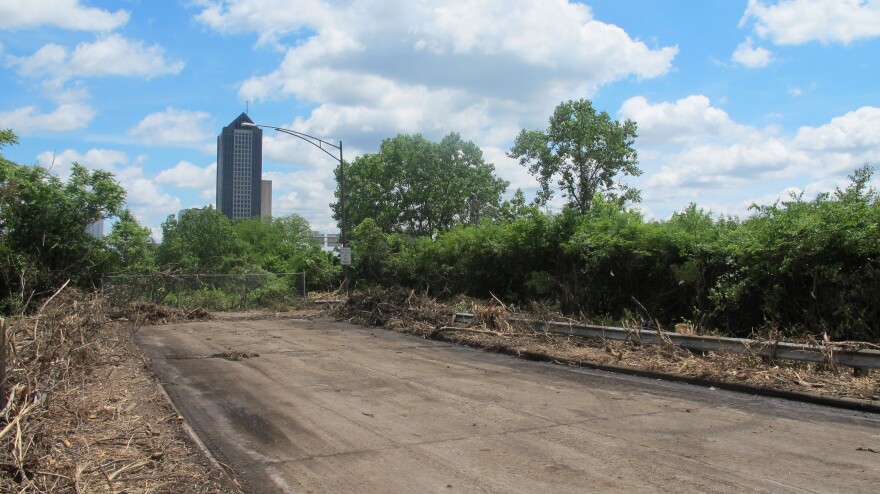Behind gas stations, near highways and beside railroad tracks, advocates from outreach groups like Maryhaven know where to find homeless campers.
At a homeless camp next to a track in Franklinton, outreach specialist Brandon Curry is greeted with a warm welcome. The camp is home to about 10 people - for now.
"I help with housing, actually," Curry tells one man. "Are you interested in housing?"
Four days a week, Curry’s out and about building relationships with the city’s homeless – setting up appointments to apply for birth certificates, social security cards and housing.
Equipped with a cooler of ice water, bus passes and appointment cards, he’s hoping to help someone move a step closer to being off the streets today.
Curry sets up Rusty Scott, whom he met for the first time during this visit, for a housing appointment next week at the Holy Family Soup Kitchen.
"You go to Grubb Street?" Curry asks. "I'll see you tomorrow at Grubb Street. Will you do that?"
"Alright," Scott says, nodding.
He's lived at the camp for the past two months, but on this day he says he's feeling especially hot and tired. He and Curry agree to meet the next day at 10:30 a.m.

But people don’t always show up to their appointments.
Lori Novotoney became homeless a year ago, after friends staying with her made off with her car. And Brandon says he’s set up about eight appointments with her.
"I'm gonna go see Brandon here at Maryhaven, and see if we can't get ourself in there," Novotoney says.
Curry estimates this is one of about 25 larger camps around Columbus. Most people are opting for smaller camps of two or three, though.
"If you group together, you're likely to get found out by the city," Curry says. "And people have this idea, the idea we'll just come and tear it down."
That's why Novotney and her fiancé spend most of their day at a nearby shelter.
"When they close, somebody's got a dinner place, and that's kind of our routine," Novotney says. "We got a tablet that we watch movies on, and that's what we do. Stay out of all the madness."
Novotney says she's seen newcomers at this camp arriving from other closed camps.
"This is the only place we can go to where we won't get run off and they tell us to go, so we haven't moved," Novotney says.
The fear of displacement isn’t unfounded. Columbus Homeless Advocacy liaison Emerald Hernandez works with advocates like Maryhaven. They’re the boots on the ground, while she’s on the administrative end.

"How large is the camp? What are we seeing in the camp?" Hernandez asks. "What's the interaction of the camp with its surrounding neighbors?"
Those are the questions the city asks before pinpointing a camp for removal - a process that takes up to a year. Hernandez says it's impossible to know the exact number of camps, because the homeless population is transient.
"The first push is we get them into housing - either a shelter or housing somewhere," Hernandez says. "But it is a process so it takes time."
That was the case with a camp just north of the Scioto Audubon Metro Park, near downtown. It was bulldozed at the end of May. Some 60 residents were given about a year's notice to leave, but only a few moved into shelters.
"We saw an astronomical amount of propane tanks, and we can’t have a wall of propane tanks," Hernandez says. "That’s why ODOT chose to step in."
More than 1,000 propane tanks littered the property. And last April, someone was murdered at the camp.
When I visited the camp, I met two people who set up a couch under the overpass. They did not want to be recorded or give their names because they did not want to be caught by the city.
The couple said they understand it's not their land, but they also have to survive and aren't here to cause trouble.

The justification for razing the camps is not just safety concerns. Trent Smith, who directs the Franklinton Board of Trade, an association of local businesses, is one of many who want camps gone along McKinley Avenue.
"It's kind of a chronic and pervasive issue we're trying to get a handle on for the long term," Smith says.
He was successful in helping push for the removal of a camp along Route 315 and Broad Street.
"But that doesn’t mean they won’t come back," Smith says. "Because it’s where they’re familiar with. It’s 'home.'"
No homeless people had returned to the camp when I visited. Though Smith isn’t sure what the solution is, he says businesses need a place at the table.
"If we’re gonna have development come farther west on Broad Street, which we absolutely anticipate, and we’re absolutely seeing that start now, we’re gonna have to address this issue in some kind of a comprehensive way," Smith says.
Any comprehensive solutions would take a lot of work. A January headcount said there were about 1,700 homeless people in Franklin County.
"It's not just put up a building and put everyone in a building," Hernandez says, "because you're still not solving the issues at hand, which are the barriers."






